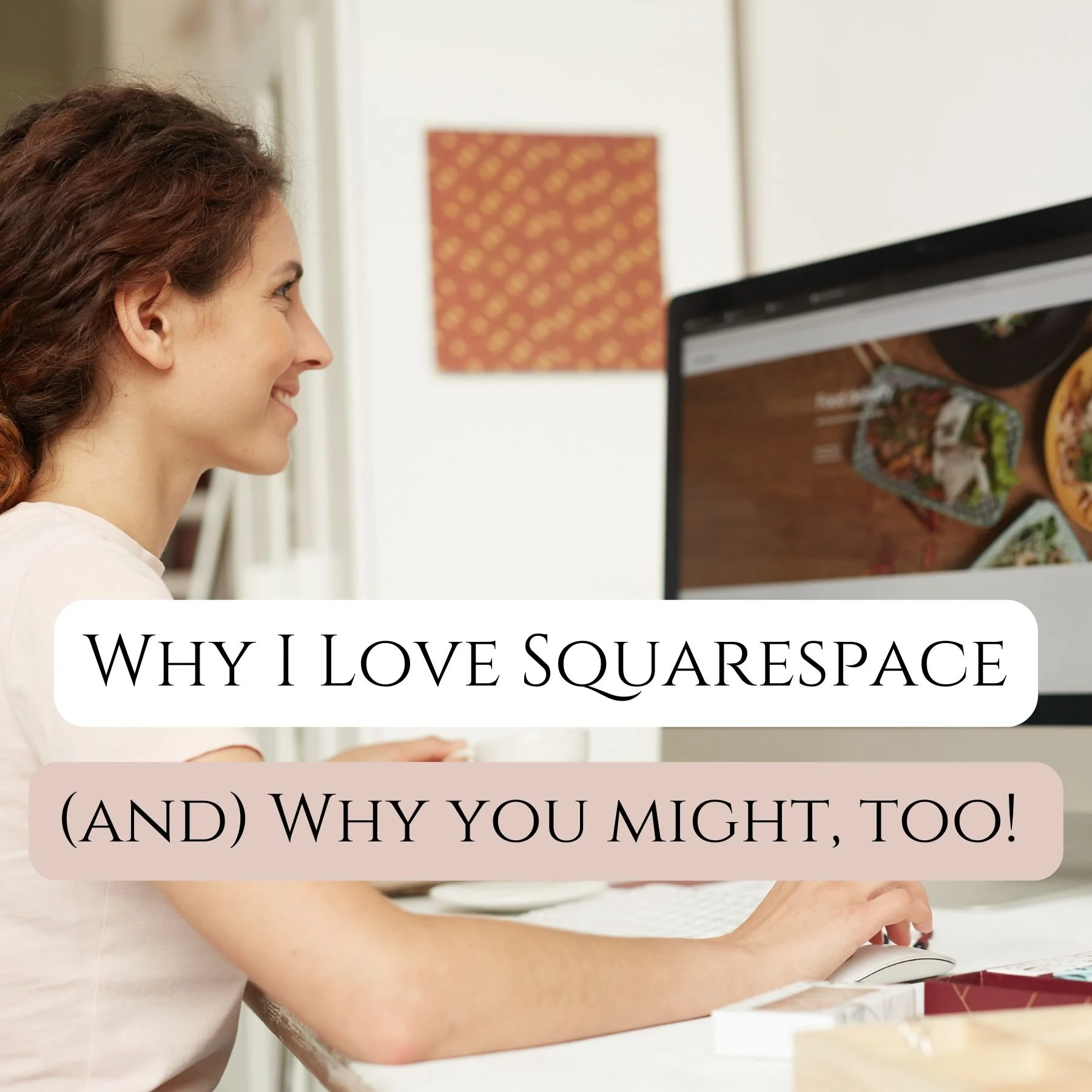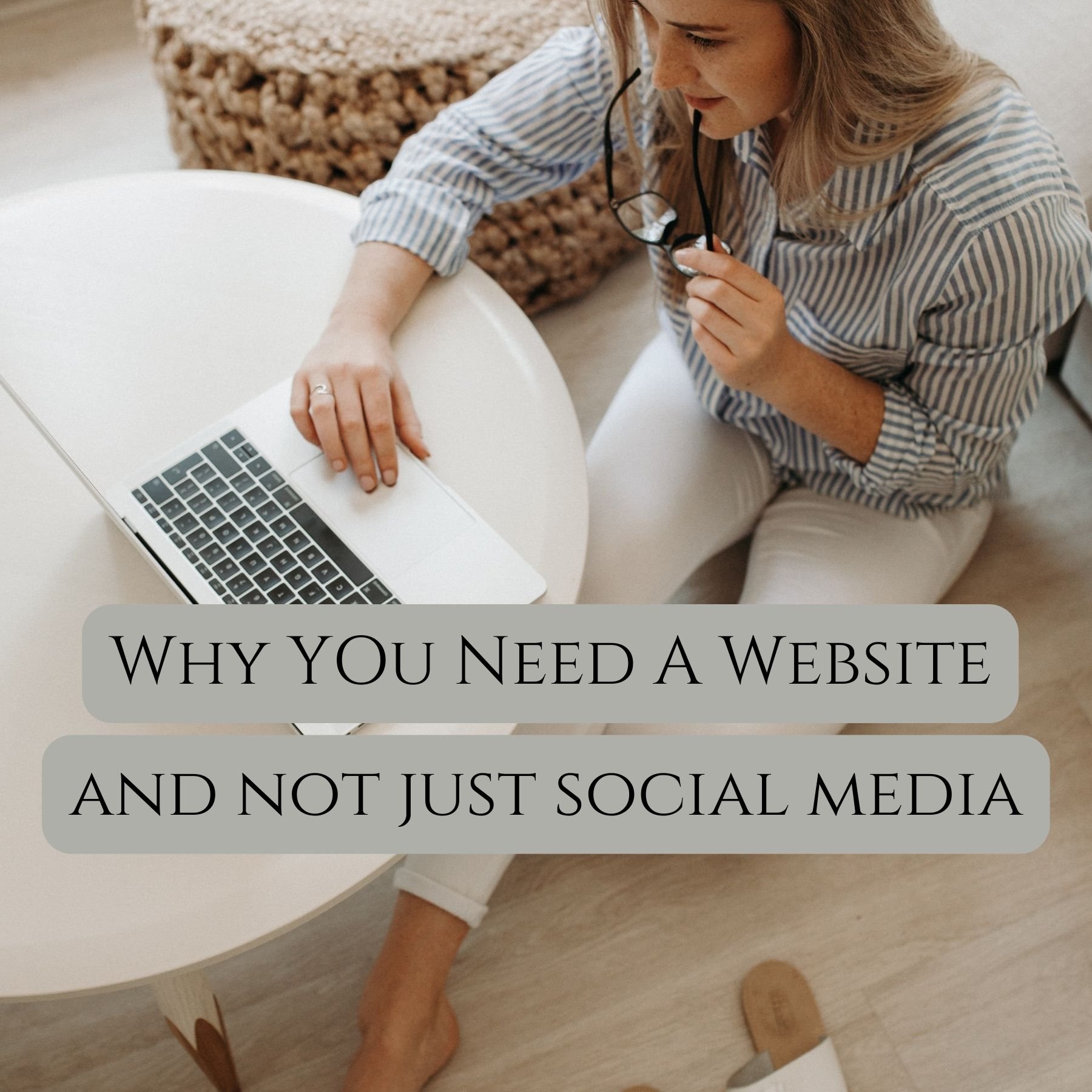Why You Need A Website And Not Just Social Media
Do websites even matter? Why bother with a website when you can do everything on social media?
These questions come up all the time. They’re great questions. If your social media channels are functioning for your business and you still don’t have a website yet, you might be asking the same thing.
Social media pages like Facebook and Instagram are important when you’re marketing your business. However, businesses still need websites. They hold the upper hand over social profiles. Websites are necessary to:
find you online through search engine optimization (SEO)
tell your story and connect with viewers
showcase your portfolio in creative ways
do e-commerce and make sales
The fact remains, social media has come a long way and they can be run on their own, without needing a website or a designer.
But the truth is, when it comes to your business, having control over some key elements is important for your success. Now, with algorithms, censorship, information control, bots, and selling your data to third-party marketing agencies, relying only on social media leaves you with less control of your business than ever before.
You might be thinking, “of course you’ll suggest I need a website, you’re a designer,” and you wouldn’t be wrong. However, it’s crucial to know your website is capable of, and affords you so much more than a social media page.
Here are ten reasons why you need a website and not just social media:
A Website Provides A Better User Experience
This is probably the most important reason you need a website for your business. User experience is important because it’s all about fulfilling your website visitor’s needs. It’s a large factor in determining the success of your site. As a business owner, you have the freedom to make your potential client’s experience appealing, easy and enjoyable. This can significantly affect conversion and retention rates. Creating useful content that is relevant and insightful to solve problems promotes trust in you as the business owner. By implementing a great user experience, you can increase your return on investment as it may lead to referrals. Furthermore, when you use your website as way to showcase how you think outside the box, show an original idea, or do something that hasn’t been done before, you give yourself a competitive edge.
A Website Gives You The Ownership + Accessibility to Audience Relationships
Have you ever considered the relationship you’re building with your ideal clients? As a business owner who is investing time into developing relationships, retaining every connection and having access to every direct new customer or client lead is essential. Let’s say you have some followers on Facebook and you’re promoting a product launch or having a sale. Out of 100, only 2-3 will get the announcement, thanks to the new algorithms. What happens, then, to the other 97? How will they discover that information? The answer is they will have to come to you, by-chance, to discover your offers. You won’t be able to go to them - they will have to come to you. This might be resolved if you pay to boost your post to get more of a reach, but there is no guarantee you’ll reach everyone. You can’t rely on third parties to communicate with your customers. When you own the relationship you create the ability to serve and take care of your clients. The best option to rely on is to own your platform - whether it be your website or email list.
Legitimacy and Establish Your Image
People want to know who you are and how you can help them. The problem with social media is its fleeting. The information gets scattered and you lose the potential you need it to have. With your own website, you have complete control over your design and the information. Furthermore, its permanent - staying there forever. To be able to establish authority, these are essential elements. People want to know what they get when they work with you, what the results are (is a given when you have a relationship), who its for, why you have the expertise and authority, and why it matters to them. You can rely on social media to display that information, but its better to communicate your authority and positioning on your website. Posts on social media are lost in a sea of thousands, constantly moving, and dispersed to who knows where. The relevance of your post, your tweet or your hashtag disappears. The information will never be organized in a way that optimizes your efforts. There’s no better way than a website to do that.
Business Growth + Success
As an online business owner you may feel building a website for your business will be too much work and a waste of money. But it can put you at a great advantage. With 70 - 80% of people researching a company online BEFORE visiting or making a purchase, the percentage of potential customers lost to businesses that do not have a website is the same - 70 - 80%. When you lose the potential for growth, your business will certainly require a lot more work. And money? It goes down the drain. (source: Blue Corona)
Paid Traffic
It expands your marketing opportunities and no matter what platforms or channels you’re using, you will want a website to support this. Without the option anymore on Facebook to run ads to a Facebook group, leveraging paid traffic won’t matter - unless you have a website! You have an automated webinar funnel? A product launch? A challenge? A masterclass? Running paid traffic to any of those things, which gets a lot of information and action going on as fast as possible, won’t happen with social media only - YOU HAVE TO HAVE A WEBSITE!
Communication
When potential customers come across your offers or products for the first time, chances are they’re not going to buy right away. But this doesn’t have to be a problem when you are in control of the communication with them. Most website hosting platforms will provide a professional e-mail. You won’t get that from social media. This gives you the ability to provide lead nurturing so your visitors and subscribers can continue getting to know, like and trust you.
Recurring Revenue for steady cash flow and value in your business entity
Websites provide many avenues to add recurring revenue. This means you can have consistent income that is reliable, month after month. Using your site for monthly retainers and subscriptions to services you offer, memberships and VIP access for ongoing training and support, and hosting are just a few ways to bring in recurring revenue. With recurring revenue streams, you create a steady cash flow, giving you more time to work on your business which, if you’re creating more opportunities to make sales, can easily result in an increase to your overall revenue. What makes this worthwhile is the greater impact of an overall increased value of your business. This is something social media channels just don’t offer because you don’t truly own the relationship or space on the platform, and you don’t control the algorithm or the reach, leaving money on the table and a missed opportunity to add value to your business as an entity.






